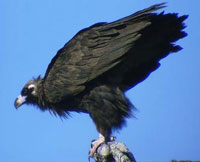Myanmar villager kills rare vulture
A rare vulture supposedly was shot dead by a villager in Myanmar on its way to homeland in Mongolia. It was freed in Thailand three weeks before the incident.

Chaiyan Kasorndorkbua, a veterinarian who oversaw the release of the cinereous vulture, said his team lost contact with it in May, only three weeks after it was freed in northern Thailand. He said he then received an e-mail in July from a rebel soldier in Myanmar's Shan State who said a villager had killed the bird. The soldier then followed up in September with photos of the vulture's radio transmitter and leg band that convinced Chaiyan that the bird was dead.
"The soldier told me that the villager had never seen such a bird so became curious and shot it," Chaiyan said. "It is common practice in Southeast Asia when people have a gun to shoot and look later. This is a tragedy."
The odds of survival were never good for the ash-gray-colored vulture named Anakin after a character in the "Star Wars" movies after it was found in southeastern Thailand last December, emaciated and apparently lost.
Veterinarians in Bangkok nursed the bird back to health, feeding it pork legs and rotten meat. Chaiyan then teamed up with Thai Airways and announced plans in March to fly the bird to Mongolia.
But fearing bird flu, China and South Korea refused to let the bird be transported through their capitals, despite tests showing it was free of the deadly virus. The vulture was later freed in northern Thailand near the border with Myanmar, also called Burma, thousands of kilometers (miles) from its home.
"It's confirmed our belief from the beginning that it was risky to release the vulture on the Thai-Burma border," said Gawin Chutima, chairman of the Bird Conservation Society of Thailand. "It's a pity. We lost a very good and rare opportunity to study the migration of one of the largest birds in Asia."
But Gawin and Chaiyan said the effort to return the vulture had raised awareness about the species' plight. Also known as the black or monk vulture, it is in decline in Asia because of habitat loss, shortage of food and shootings by villagers who believe the bird brings them bad luck.
"There remains a bad perception about vultures. We have to change that," Chaiyan said. "We may have lost this vulture. But with rehabilitation programs like this, we can raise public interest and awareness about vulture conservation."
The cinereous vulture normally not found in Thailand is defined as near-threatened by the World Conservation Union. Though its numbers are declining in Asia, conservation efforts have boosted the population in Greece, Spain and other parts of Europe. Its global population is estimated at between 14,400 and 20,000.
Subscribe to Pravda.Ru Telegram channel, Facebook, RSS!


